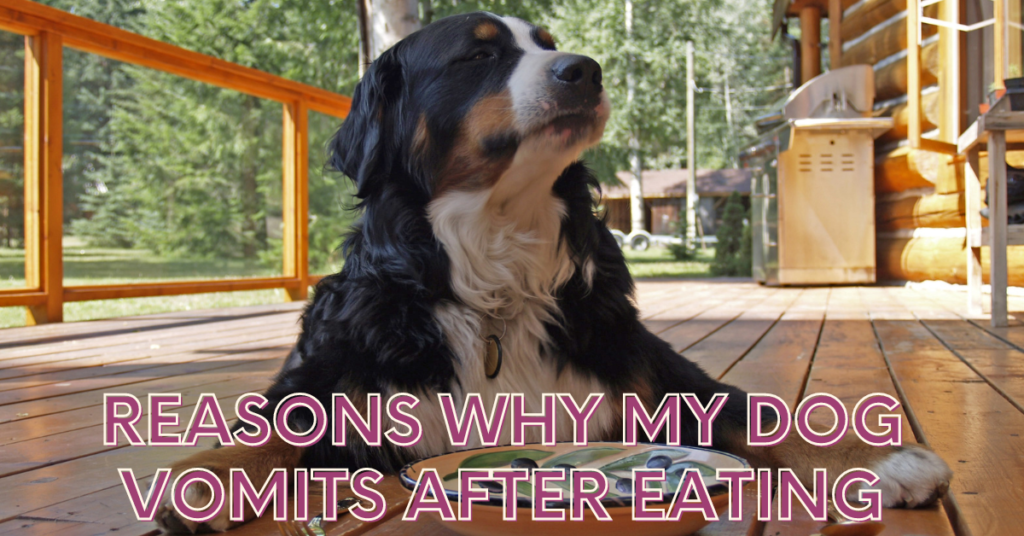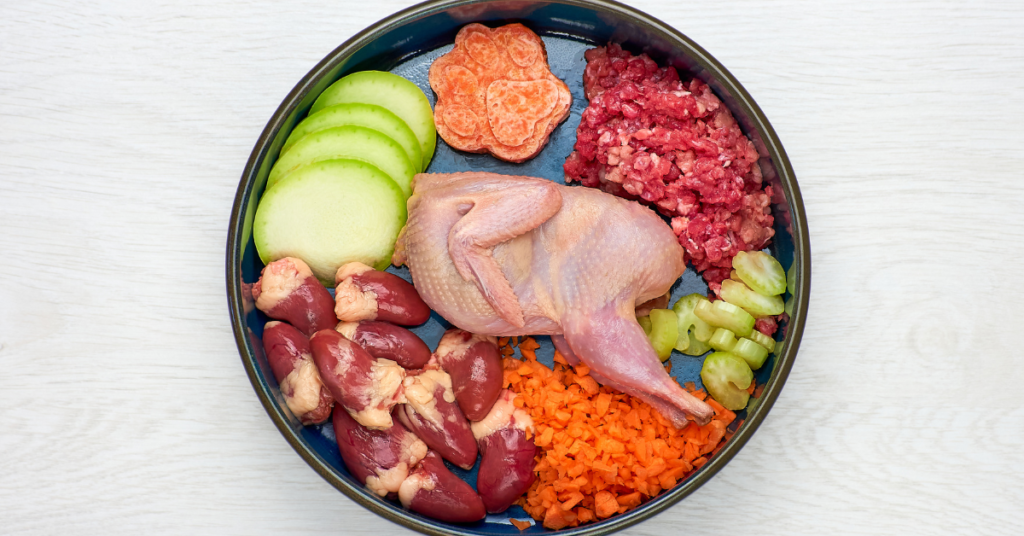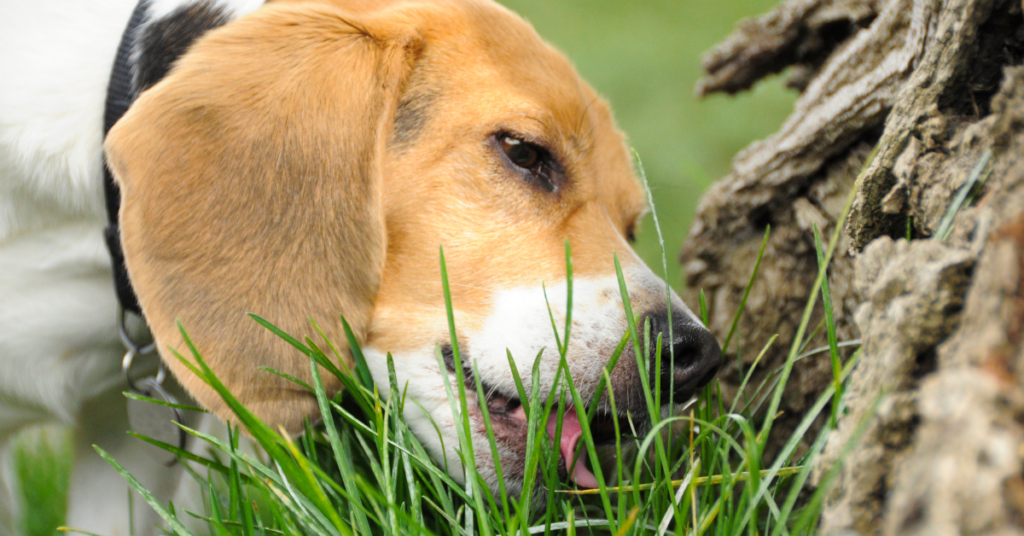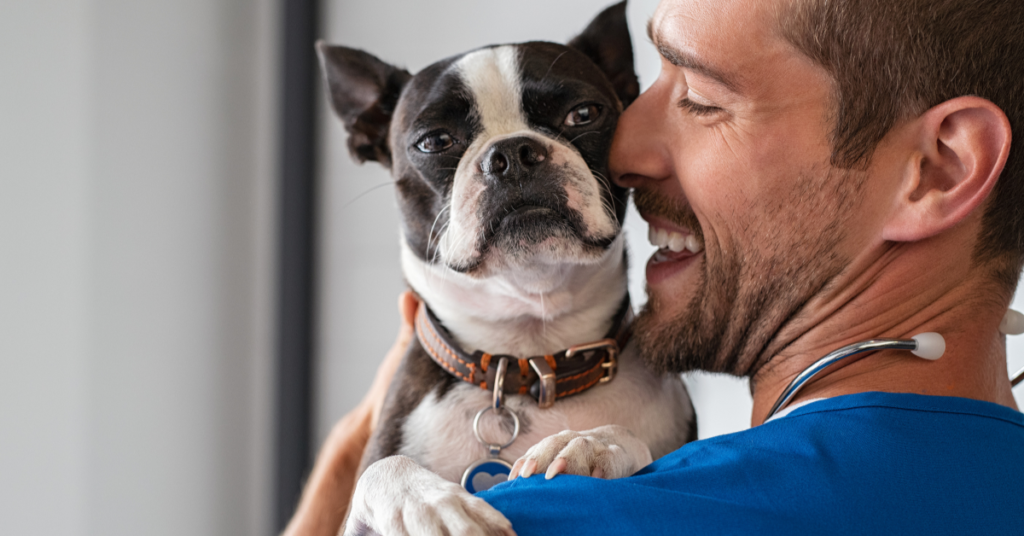


We all know dogs are very loyal to us, so we are responsible for caring for our dogs in the best way possible. Have you ever looked at your furry buddy and thought, “Why does my dog vomit after eating?” this is a very common question every dog owner wants to know about their furry buddy’s behavior. In this article, we’ll explore common reasons why my dog vomits after eating more than just their meal.
Reasons Why My Dog Vomits After Eating

So, Why did my puppy vomit after eating? First, just like humans, dogs can suffer from various stomach issues. Problems with the gastrointestinal tract, which includes the stomach and intestines, can result in vomiting. Sometimes, issues like kidney disease can be the root of the problem. Food allergies, illnesses, cancer, infections, medicines, parasites, toxins, and plants are some of the most prevalent causes of vomiting. Instances of overeating, foreign bodies, bloating, and constipation can also result in vomiting.
However, the cause may be less complicated. Dr. Roslyn states, “Some owners have different ideas about how much is acceptable to feed their pet.” If your pet has a sensitive stomach, giving them too much food at once may result in vomiting. In that instance, a veterinarian may suggest a prescription diet or high-quality premium nutrition.
Diet Problems: Why Does My Dog Vomit After Eating?

One possible cause of why my dog vomits after eating? It is a change in diet. Dogs have delicate stomachs, and just as some people cannot tolerate particular foods, so can our four-legged companions. You might be shocked to find that some dogs are allergic to bananas. Yes, those potassium-rich yellow fruits that humans adore can occasionally cause stomach upset in our canine pals. If you’re wondering why my dog vomits after eating a banana, it’s most likely due to their unique digestive idiosyncrasies.
Let’s Find Out Puppy Issues:
Puppies are curious explorers whose stomachs may be more fragile than adult dogs. If you’re wondering, “Why does my puppy vomit after eating?” consider their youthful excitement and the fact that they may overeat or swallow their food too rapidly. This can cause indigestion and, as a result, vomiting. Regarding eating, puppies, like human babies, require more care and attention.
Why Dogs Vomit After Eating Grass?

That’s an age-old question: why does my dog puke after eating grass? Contrary to popular belief, this is not necessarily cause for concern. When dogs are feeling a little off-kilter in the belly section, they have been known to munch on grass. Some experts say dogs do this to help themselves throw up and ease discomfort. It’s like their body’s natural way of restarting their digestive system. So, if you notice your dog eating on the grass now and then, they could be channeling their inner herbalist.
Frozen Treats are to be blamed for vomiting.

Have you ever wondered why my dog vomited after eating something cold? Ice, ice, ice cream, or even snow may be involved depending on how chilly it is. Although they seem refreshing, cold meals may cause an unanticipated gastrointestinal upset. Therefore, remember that their delicate stomachs may not be as delighted about the frosty surprise as you’d expect if you ask, “Why does my dog vomit after eating ice cubes?” Naturally, it’s difficult to resist giving them a taste of our favorite frozen sweets, but moderation is key.
Regurgitation Isn’t Always Vomiting!
What’s the distinction between vomiting and regurgitation? That is an excellent question! While vomiting involves the abrupt expulsion of stomach contents, regurgitation is more akin to a passive ejection, frequently undigested and in the form of a tubular shape. So, if the question pops up, “Why does my dog regurgitate after eating?” If regurgitation continues, you must consult your veterinarian because the best vet can ensure your pet is in good health.
Frozen Delights Can Upset Bellies:
We all enjoy ice cream on hot days, but what about our canine companions? If you’ve ever asked yourself, “Why does my dog throw up after eating ice cream?” the explanation is lactose intolerance. Many dogs may not have the enzyme to digest lactose, which is common in dairy products such as ice cream. Similarly, while snow appears to be a delightful and safe treat if you’re wondering, “Why does my dog throw up after eating snow? It is not safe for dogs to eat snow. While giving them a sample of our homemade snacks may be tempting, it’s best to stick to dog-friendly options.
How to Take Care of Your Dog Suffering from Vomiting

Let’s speak about how to help our animal friends who are a little uncomfortable after eating. Although it’s unpleasant to witness them in pain, we may take steps to look after them.
Keep Calm
First and foremost, don’t panic. It can be frightening to witness your dog vomit, but remaining cool is essential. Take a deep breath and remember we’re here to help our four-legged pals.
Pay attention to Behaviour.
Keep an eye on your dog’s behavior. Is this a one-time occurrence, or does it happen frequently? Is your dog acting normally? It may not be a significant concern if it is an uncommon event and your dog is still active and happy.
Examine Their Food
Examine what your dog ate before vomiting. Did they eat something unusual or eat too quickly? Dogs can become ill if they eat too quickly. It would help if you thought about buying a slow feeder dish to assist them in eating more slowly.
Provide Small Meals
If your dog vomits after a large meal, consider feeding them smaller portions throughout the day. This can assist their stomach in coping with the food better.
Keep an Eye on Their Water
Please keep your dog hydrated, but don’t give them too much water shortly after they vomit. Small sips of water taken over time may be best for their stomach.
Avoid the Sweets
If your dog is acting strangely, avoiding giving him goodies is best. Treats might sometimes aggravate their stomach even more.
Consult a veterinarian.
If your dog continues to vomit or appears to be in pain, it’s time to call the vet. They are specialists who can provide the best possible treatment for your dog. They might need to run some tests to figure out what’s wrong.
Take the Vet’s Advice
Pay attention to what the veterinarian says. They may advise you to adjust your dog’s diet, administer medication, or propose other therapies. Following their advice is critical to making your pet feel better.
Keep a Close Eye on Them
Continue to keep an eye on your dog after the vet visit. It would be fantastic if they started acting better! However, if things do not improve or worsen, do not hesitate to contact the veterinarian again.
Plenty of Love and Rest
Finally, provide your dog with love and attention. They may feel depressed so a few extra cuddles might go a long way. And don’t forget to give them some rest; they, like us, need time to heal.
Finishing Touches
There you have it, dear readers, and a piece of better knowledge about why my dog vomits after eating. And why your favorite animal buddy may periodically encounter stomach issues. From nutritional allergies to overexcited puppy bellies, the complicated nature of grass nibbling, and the frosty consequences of icy pleasure, the world of doggie digestion is truly intriguing. So, the next time you think about, “Why does my dog vomit after eating?” remember that a little knowledge goes a long way towards giving the greatest care to your devoted companion. Stay positive, stay interested, and keep those tails wagging! Your dog’s stomach and tail will thank you.

